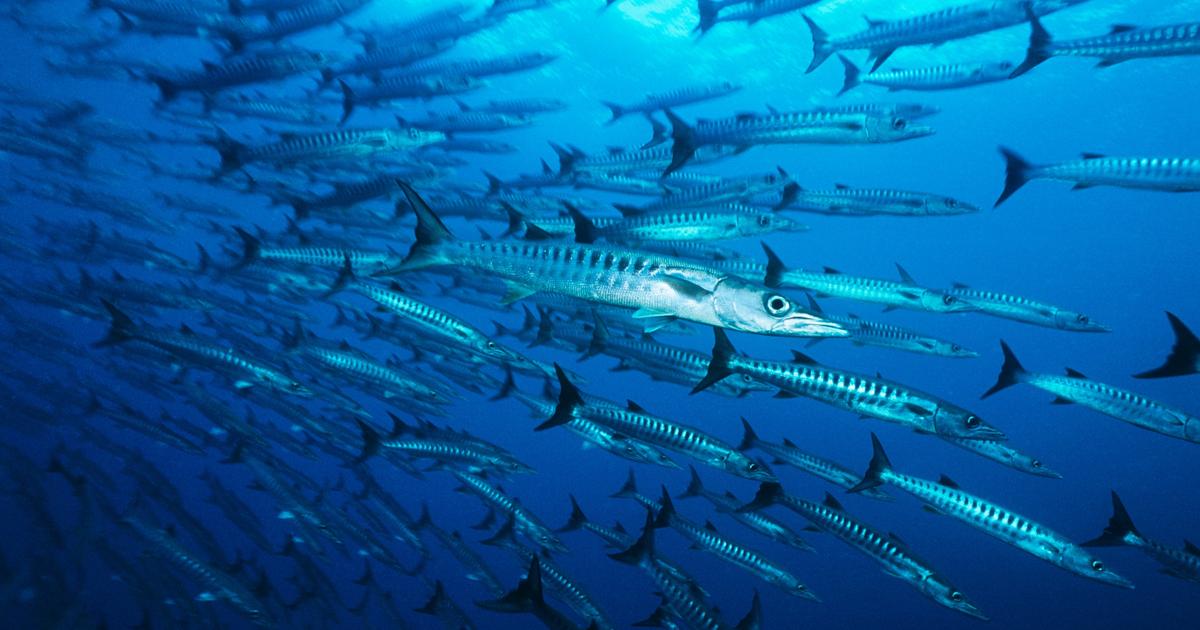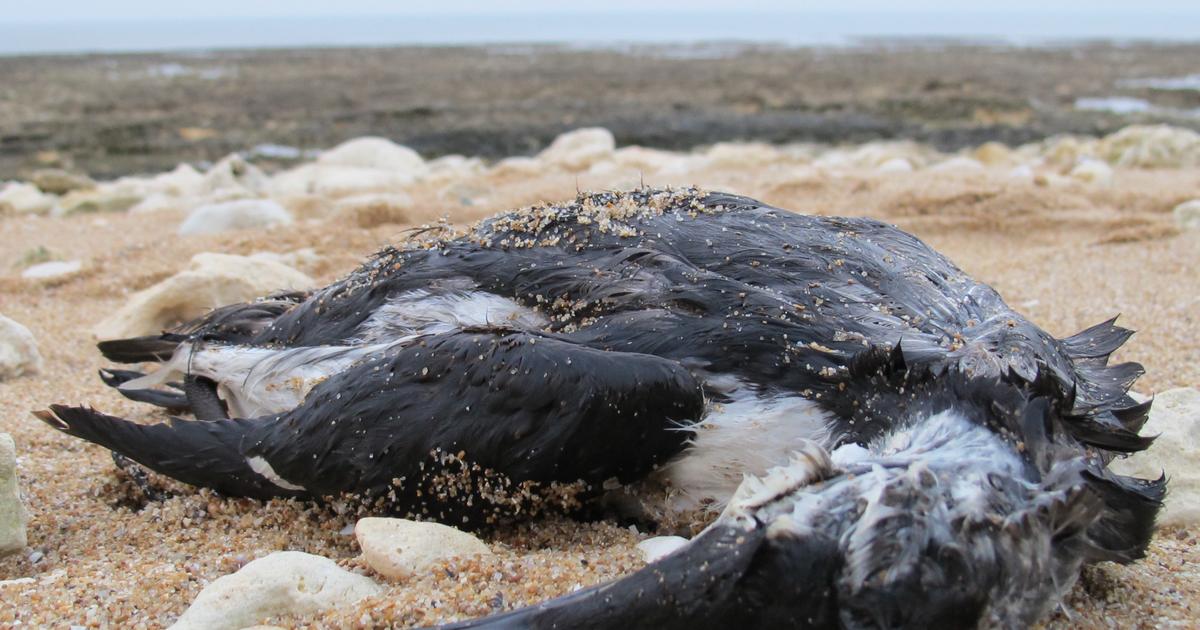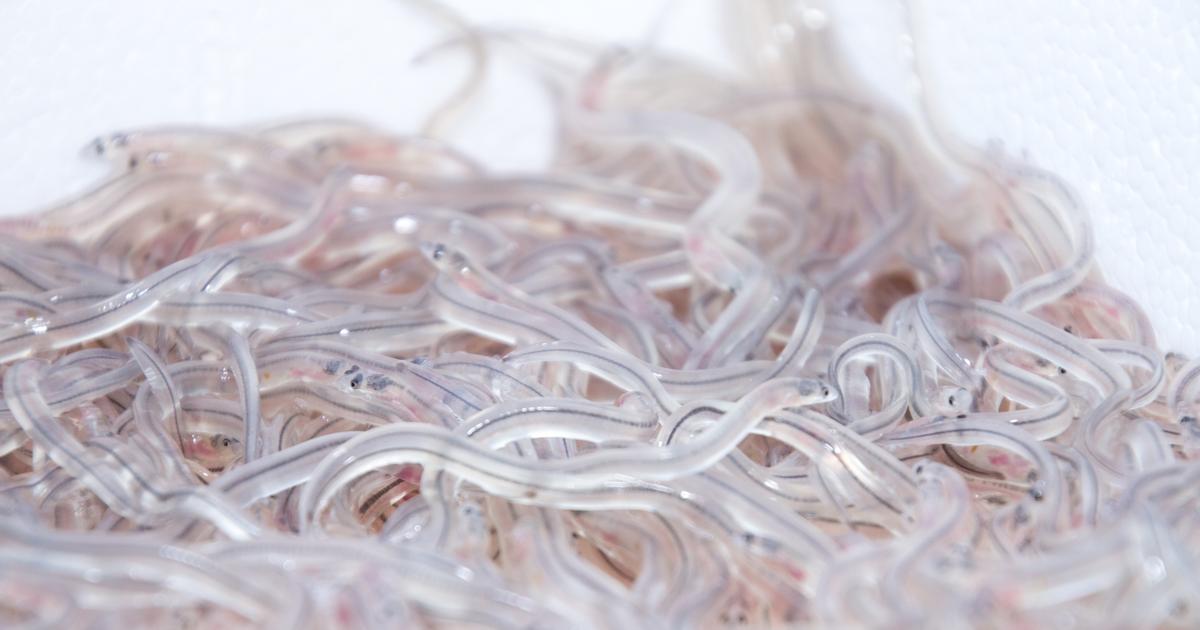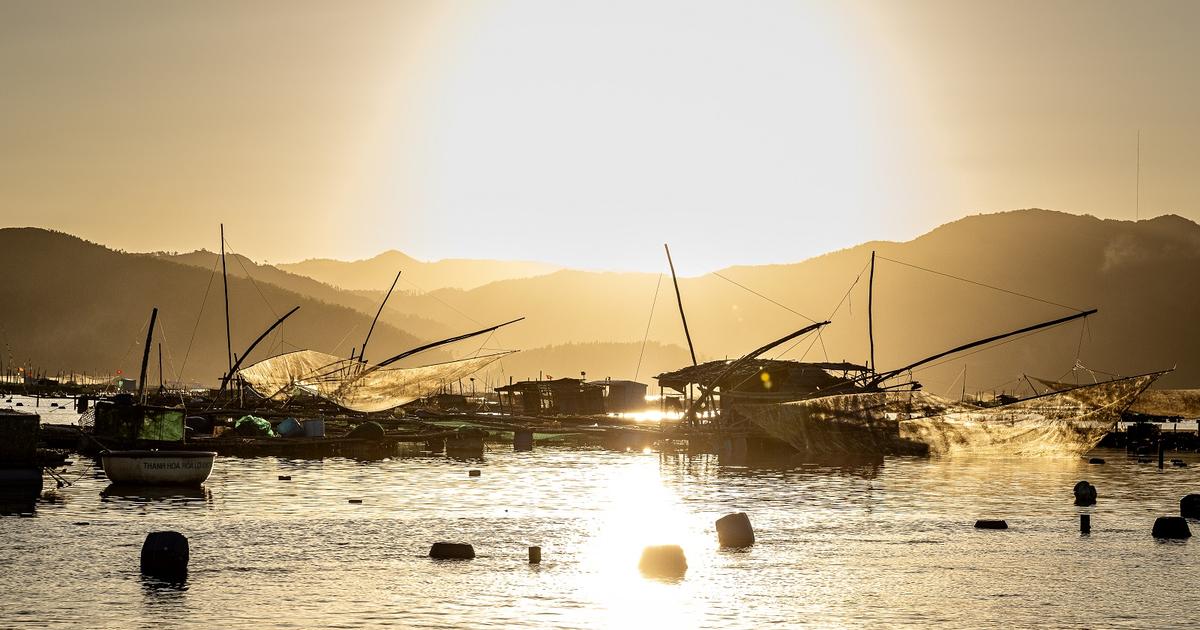Enlarge image
Chinese trawler in the waters of Gambia
Photo:
Fábio Nascimento / The Outlaw Ocean Project
During the day there is a lot going on on the white sandy beaches of Gunjur, a town of 15,000 on the Atlantic coast in southern Gambia.
Fishermen steer long, brightly painted wooden canoes, so-called pirogues, to the shore, where they hand over their still fluttering catch to women who are already waiting there.
Little boys play soccer, tourists watch from their deck chairs.
In the evening, when it gets dark, countless campfires flicker on the beach, there is drums, men with oiled breasts engage in traditional wrestling matches.
Enlarge image
Local fishing boat on Gambia's coast
Photo: Peter Schickert / imago images
But the idyll is deceptive.
A few hundred meters from the beach, a pungent stench hits me, reminiscent of rotten meat.
The Chinese fishmeal factory Golden Lead is hidden behind a three-meter-high wall made of white corrugated iron, a system made up of several concrete buildings the size of a football field and sixteen silos in which dried fishmeal and chemicals are stored.
Video footage secretly captured by a worker inside Golden Lead shows that the facility is cavernous, dusty, hot and dark.
Sweating profusely, several men shovel shiny piles of bongas into a steel funnel.
A conveyor belt transports the herring-like fish into a vat, in which it is ground into a sticky pulp before the oil is extracted in a long cylindrical oven.
The remaining substance is ground into a fine powder and dumped on the floor in the center of the warehouse, where it piles up into a meter-high golden mound.
Enlarge image
The Chinese Golden Lead fishmeal factory on the Gambian coast: 800,000 kilos of fishmeal per day
Photo: Xaume Olleros
After the powder cools, workers shovel it into 50 kilogram plastic bags that are stacked from floor to ceiling.
One shipping container holds 400 bags, and the men fill around 20 to 40 containers a day, reports environmental activist Mustapha Manneh.
800,000 kilos of fish meal per day.
Every day here from Gunjur in Gambia, the smallest country on the African mainland, shipping containers full of fishmeal are transported mainly to China and Norway, where it is fed to salmon and other fish in the booming aquaculture industry, which is then fed to European and American supermarkets and land on our plates.
Global per capita consumption of fish and seafood has doubled since the 1960s, and the growing world population's appetite for fish is greater than what we can catch sustainably: wild fish stocks are collapsing or cannot withstand further fishing.
The solution: aquaculture, i.e. fish farming instead of catching.
The aquaculture industry is now responsible for about half of the world's fish consumption and - valued at more than $ 260 billion - the fastest growing segment of global food production.
Enlarge image
Norwegian farmed salmon is sold at a weekly market in Lower Saxony
Photo: Holger Hollemann / picture alliance / dpa
The biggest challenge in fish farming: feeding the animals.
Depending on the fish, feed accounts for between 50 and 90 percent of the operating costs of the industry, and so far the only commercially usable source of feed is fishmeal.
The aquaculture farms sometimes consume more fish than they later deliver to supermarkets and restaurants.
Before it goes to market, a farmed tuna can eat more than fifteen times its weight in wild fish that has been made into fishmeal.
Around a quarter of all fish caught in the sea around the world now end up as fish meal produced by factories such as the one on the Gambian coast.
Enlarge image
The people in Gambia hardly benefit from the Chinese fishmeal factories, on the contrary: They lose their food and livelihoods, their income - and their nature
Photo: Andrew Woodley / UIG / imago images
West Africa is one of the fastest growing producers of fishmeal: More than fifty processing plants such as Golden Lead have been established along the coasts of Mauritania, Senegal, Guinea-Bissau and Gambia - and global demand for their goods has exploded.
But the people in Gambia get next to nothing from it.
On the contrary: They lose their food and livelihood, their income - and their nature.
Golden Lead is an outpost of an ambitious economic and geopolitical agenda in China, also known as the Belt and Road Initiative.
The Chinese government says it wants to build goodwill abroad, promote economic cooperation, and offer poorer countries otherwise inaccessible development opportunities.
Enlarge image
Golden Lead in the Gambian capital Banjul: In 2017, China canceled Gambia $ 14 million in debt and invested $ 33 million in agricultural and fisheries development in the country
Photo: Abdoulie John / AP
As part of the initiative, China has become the largest foreign financier of infrastructure development in Africa and dominates the market for most of the continent's road, pipeline, power plant and port projects.
In 2017, China canceled the Gambia $ 14 million in debt and invested $ 33 million in agriculture and fisheries development in the country, including Golden Lead and two other fish processing plants along the 80-kilometer Gambian coast.
Gunjur residents were told that Golden Lead would bring jobs, a fish market, and a newly paved road through the heart of the city.
Enlarge image
Ansu Sanyang is a local fisherman in Gambia: Because he had little work and could hardly earn anything for his family, the young man wanted to try to migrate to Europe via Libya - like many Gambians (archive picture)
Photo: SEYLLOU / AFP
For the local fishermen, who mostly cast their nets by hand from pirogues, the rise of aquaculture means above all: hundreds of legal and illegal foreign fishing vessels, including industrial trawlers and purse seine vessels, cruising in the waters off the Gambian coast Decimate fish stocks in the region and thus endanger the livelihoods of the local people.
"We can't keep up," says a woman who sells her fish between the factory and the beach.
Your basket is only half full.
"It all goes there," she points to the factory.
Enlarge image
Traditional fish market in Gambia: While bonga fish was so abundant two decades ago, according to local residents, that it was given away in some markets, it now costs more than most locals can afford
Photo: Peter Schickert / imago images
A few hundred yards away, Dawda Jack Jabang, the 57-year-old owner of Treehouse Lodge, an abandoned hotel and restaurant on the beach, is staring at the breaking waves.
"Golden Lead destroyed my life overnight," he says.
Bookings for the hotel have fallen sharply and the stench is so strong at times that guests leave his restaurant before they have finished eating, he says.
Golden Lead did more harm than good to the local economy, says Jabang.
And what about all the young men dragging their baskets of fish to the factory?
Jabang waves it aside: “This is not what we want to do.
They turn us into donkeys and monkeys. "
Only a few benefit from the jobs in the factories.
Fishmeal is relatively easy to make and the process is highly mechanized, meaning that facilities the size of Golden Lead only need about a dozen men per shift, according to environmental activist Manneh.
In addition, while the bonga species was so abundant two decades ago, according to local residents, that the fish was given away in some markets, it now costs more than most locals can afford.
In fact, the price has risen sharply in recent years.
And half of the Gambian population lives below the poverty line - and fish, especially bonga, covers half of the country's animal protein needs.
In September 2019, Gambian lawmakers gathered for an annual session at which James Gomez, the country's Minister for Fisheries and Water Resources, insisted that "the Gambian fisheries are thriving".
Gomez refused to comment on criticism of the three fishmeal factories, including their insatiable consumption of bonga, Manneh reports.
"The boats do not take more than a sustainable amount," said the minister, adding that the Gambian waters even had enough fish to supply two more factories.
It is not the first time that the Gambian government has defended Chinese donors.
On the morning of May 22, 2017, the Gunjur community discovered that the Bolong Fenyo lagoon had turned a cloudy purple overnight, littered with floating dead fish.
"Everything is red," wrote a local reporter, "and every living thing is dead."
The Bolong Fenyo game reserve was established in 2008 by the Gunjur community and served to protect more than 300 hectares of beach, mangrove swamp, wetland, savannah and an elongated lagoon.
The lagoon, about a kilometer long and a few hundred meters wide, is a lush habitat for migratory birds, humpback dolphins, bats, Nile crocodiles and monkeys.
A marvel of biodiversity, the reserve is an integral part of the area's ecological health - and with the hundreds of bird watchers and other tourists visiting each year, the area's economic health as well.
Enlarge image
The Bolong Fenyo Game Reserve is adjacent to the Golden Lead Fishmeal Factory
Photo: Xaume Olleros
To find out what had happened to their lagoon, some residents filled bottles with water from the lagoon and took them to the one person in town they thought could help: Ahmed Manjang.
Born and raised in Gunjur, Manjang now lives in Saudi Arabia, where he works as a senior microbiologist.
When he happened to be visiting home, he collected samples for analysis himself and sent them to a laboratory in Germany.
The results were alarming: the water contained twice the amount of arsenic and tens of times the amount of phosphates and nitrates that are considered safe.
Manjang wrote a letter to the Gambia's environment minister and called the lagoon's death "an absolute catastrophe."
And the biologist concluded that the pollution on this scale could only come from one source: illegally dumped waste from the Chinese fish processing factory Golden Lead, which operates on the edge of the reserve.
Enlarge image
Fish meal production in Gambia
Photo: Fábio Nascimento / The Outlaw Ocean Project
After the Gambian environmental authorities fined Golden Lead, the comparatively small amount of which Manjang described as "poor and offensive," the company stopped discharging its toxic sewage directly into the lagoon.
Instead, a long sewer pipe was laid under a nearby public beach - and the sewage dumped directly into the sea.
Swimmers soon complained of rashes, the sea overgrown with algae, and thousands of dead fish washed ashore, along with eels, rays, turtles and dolphins.
Local residents lit scented candles and incense to combat the rancid smell that came from the fishmeal factories, and tourists wore masks.
Manjang contacted environmentalists and journalists, as well as Gambian lawmakers, but was soon warned by the Gambian trade minister, he reports, that advancing the issue would only endanger foreign investment.
Bamba Banja, the state secretary for the Ministry of Fisheries and Water Resources, also told a local reporter that the terrible stench was just "the smell of money."
Jojo Huang, the factory's director, has publicly denied the pollution of nearby waters, saying the facility complies with all waste disposal regulations.
And Golden Lead said the facility invested in local education and made Ramadan donations to the community - it was good for the city.
Ian Urbina
is an investigative reporter and director of the
Outlaw Ocean Project
, a not-for-profit journalists' organization based in Washington, DC that focuses on reporting on environmental and human rights crimes at sea.
Translation and editing:
Lena Greiner
This contribution is part of the Global Society project
Expand areaWhat is the Global Society project?
Under the title Global Society, reporters from
Asia, Africa, Latin America and Europe
report on injustices in a globalized world, socio-political challenges and sustainable development.
The reports, analyzes, photo series, videos and podcasts appear in the international section of SPIEGEL.
The project is long-term and will be supported for three years by the Bill & Melinda Gates Foundation (BMGF).
A detailed FAQ with questions and answers about the project can be found here.
AreaWhat does the funding look like in concrete terms?
The Bill & Melinda Gates Foundation (BMGF) is supporting the project for three years with a total of around 2.3 million euros.
Are the journalistic content independent of the foundation?
Yes.
The editorial content is created without the influence of the Gates Foundation.
Do other media have similar projects?
Yes.
Big European media like "The Guardian" and "El País" have set up similar sections on their news sites with "Global Development" and "Planeta Futuro" with the support of the Gates Foundation.
Have there already been similar projects at SPIEGEL?
In recent years, SPIEGEL has already implemented two projects with the European Journalism Center (EJC) and the support of the Bill & Melinda Gates Foundation: The "Expedition The Day After Tomorrow" on global sustainability goals and the journalistic refugee project "The New Arrivals", as part of this several award-winning multimedia reports on the topics of migration and flight have been produced.
Where can I find all publications on global society?
The pieces can be found at SPIEGEL on the topic Global Society.















